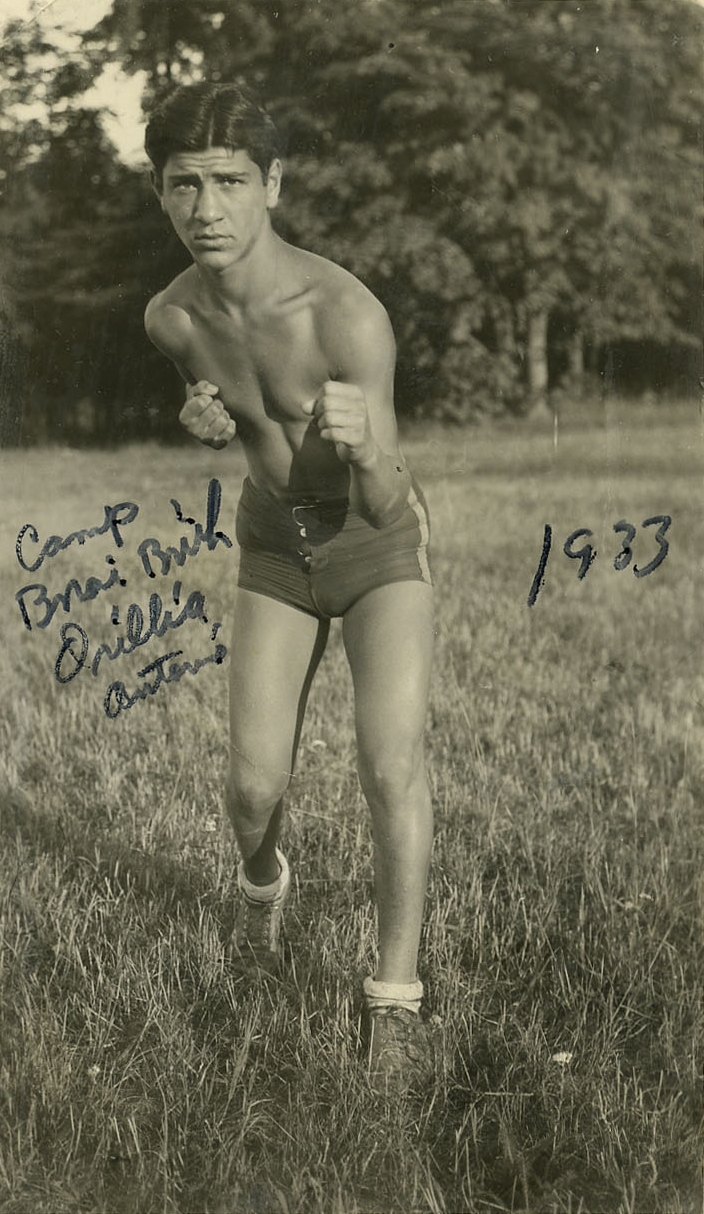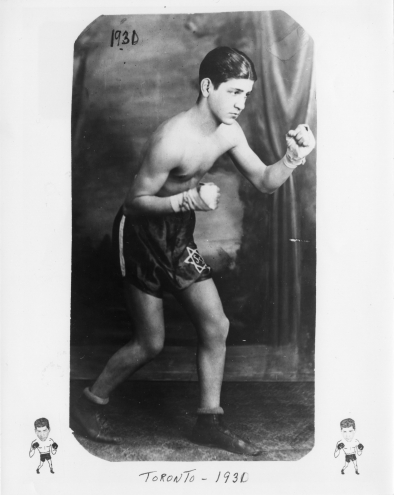Sammy Luftspring
 Sammy Luftspring (1916–2000) was born on 14 May 1916 in Toronto’s St. John’s Ward to working-class Jewish parents who had emigrated from eastern Europe. In the 1930s, Luftspring became famous as a boxer. He was known for his fighting prowess and his Jewish pride, always sporting a Star of David on his boxing shorts.
Sammy Luftspring (1916–2000) was born on 14 May 1916 in Toronto’s St. John’s Ward to working-class Jewish parents who had emigrated from eastern Europe. In the 1930s, Luftspring became famous as a boxer. He was known for his fighting prowess and his Jewish pride, always sporting a Star of David on his boxing shorts.
The coinciding of Luftspring’s birth with the Ontario Temperance Act had a major impact on his family’s life. According to his memoir Call Me Sammy, Luftspring’s parents, aunt, and grandmother were all bootleggers. Luftspring claimed that it was a very common occupation at the time, with much of the business taking place on the kitchen table. The family was able to move from the Ward to Kensington Market because of their success in this business.
Kensington Market is where Luftspring grew up. He remembers many respectable citizens but also those who operated outside of the law: thieves, hoods, gamblers, pimps, hookers, hustlers, bookies, and bootleggers. He himself did not receive much of an education and speaks about growing up in poverty.
Luftspring began training as a youth at the Brunswick Ave. YMHA. In 1932, he started competing in boxing matches. He competed in 105 fights and lost only five, winning Golden Glove tournaments in weight classes ranging from bantamweight to welterweight. By 1933, he had claimed the Ontario lightweight title, representing the Elm Grove boxing club. His skill as a fighter along with his Jewish pride and contributions to the community earned him fame within the Jewish community but also beyond his Kensington Market roots.
In 1936, Luftspring was selected to participate at the Berlin Olympics. Although he was eager to compete, he made the decision to protest the games over the Nazi's treatment of Jews in Germany. Luftspring and "Baby Yak," another established local Jewish boxer, instead decided to participate in the alternate games in Barcelona, Spain, which were called the People's Olympics. After making the trip to Europe by ship, the two faced the disappointment of having the event cancelled after the Spanish Civil War broke out on the eve of the opening ceremonies.
In the late 1930s, following the disappointing event in Spain, Luftspring began to box professionally. In 1938, he won the Canadian welterweight championship after a fifteen-round fight defeating Frank Genovese. He held the title for two years. In 1940, during a fight in New York against Steve Belloise, Luftspring was poked in the eye, which resulted in a detached retina. This injury left him blind in one eye, ending his boxing career. This was a great disappointment to Luftspring. In order to support his family, he worked at a series of jobs over the next several years, including driving a cab.
By 1948, he began a new career as a boxing referee. He refereed for several decades, overseeing some of the most celebrated fights of the time. He and three partners also ran a nightclub in Toronto called the Mercury Club. It attracted famous entertainers such as Henry Youngman, Vic Damone, and Tony Bennett. He subsequently ran other nightclubs such as the Tropicana.
Sammy was a devoted family man. He married his wife Elsie in 1938 at the McCaul Street Synagogue. Three-hundred-and-fifty people attended the ceremony and hundreds waited outside to wish them well. Sammy and Elsie had two children: Brian and Orian. Luftspring was honoured in 1985 with an induction into Canada's Sports Hall of Fame. He passed away on 27 September 2000 at the age of eighty-four.
